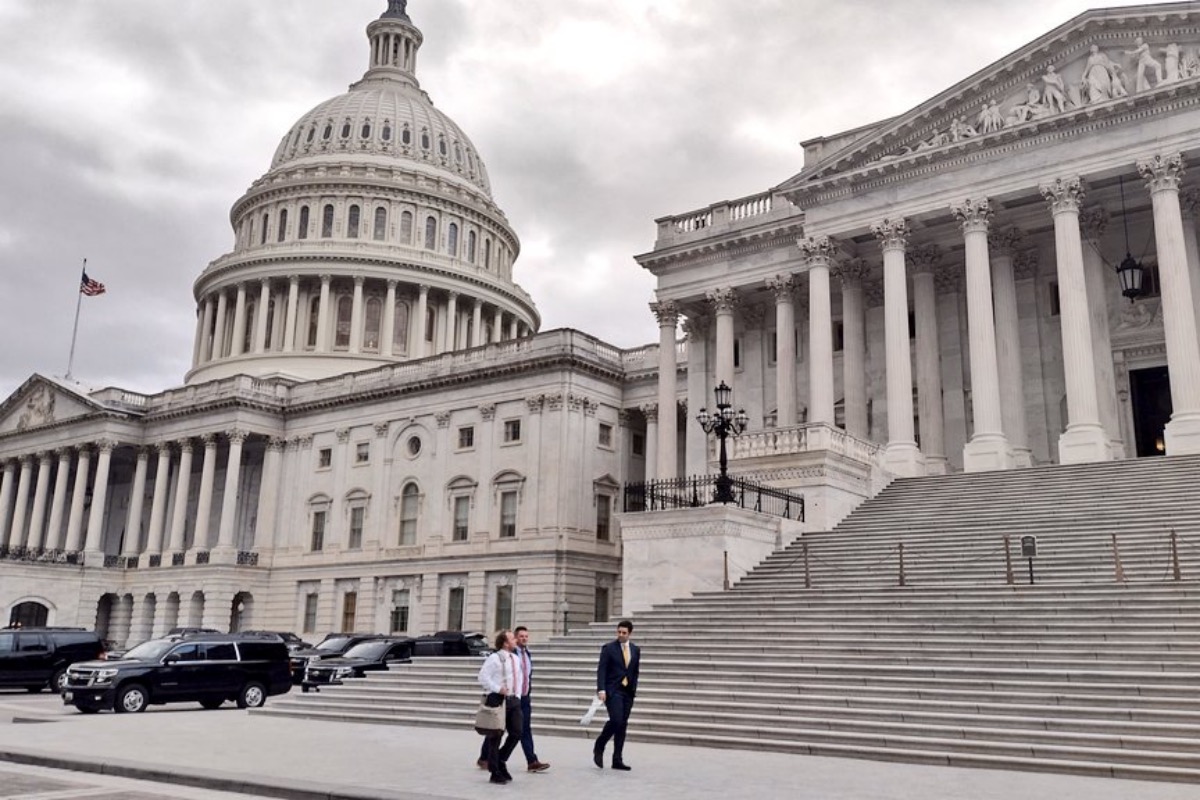

The Capitol Building in Washington, D.C. (Pablo Manríquez/Latino Rebels)
WASHINGTON, D.C. — “It was the nerdiest pizza party ever,” said Zoe Bluffstone, press steward for the Congressional Progressive Staff Association (CPSA), of a watch party the organization hosted Tuesday night.
They were watching the House chamber, where a resolution by Rep. Andy Levin (D-MI) to protect the nearly 9,100 House staffers from retaliation for forming unions, among other things, was attached to a rule to advance a Ukrainian relief package.
CPSA members were jubilant as the rule, and thus the resolution, was passed —or “deemed,” in the technical parlance of Congress— by a party-line vote of 217 to 202.
“We signed up a bunch of new members at the watch party,” said a CPSA organizer who attended the event. “Now we’re at over 1,000 members, which is huge.”
One thousand and forty-eight, to be exact. That’s how many Hill staffers have signed up to be CPSA members, according to the organization, which amounts to just over 10 percent of the staffer workforce in the House of Representatives.
The CPSA was launched last summer under the watchful eye of Rep. Zoe Lofgren (D-CA), chair of the Committee on House Administration, the entity that gave the CPSA formal approval.
“The Congressional Progressive Staff Association (CPSA) will work to advance the interests of this growing body of progressive staffers and shift the dialogue at the staff level in Congress away from divisive partisanship,” the CPSA said in a statement when it launched. “It’s time that progressives on the Hill take a lesson from our local counterparts: get organized, get energized.”
The House Administration Committee currently lists 13 staff associations active in the 117th Congress, with Rep. Mark Pocan (D-WI) as the member sponsor for the CPSA.
Congressional staff associations are typically bicameral groups of workers in member offices uniting specific groups, like Hispanic, Black, Jewish, Korean American, Middle Eastern, or Haitian staffers. These groups of staffers meet to discuss ways to advance the common interests of the given association in Congress.
“D.C. has had a history of staffers being more progressive than the members,” said Hill staffer Dagoberto Acevedo in an interview last year with Latino Rebels. “We have staffers in the association that do come from progressive caucus members and so for them to formulate a policy shop to better understand the policy but also see how their offices can intertwine to push that agenda forward is really important.”
“As a collective, we understand that ‘I’ can’t do this alone,” Acevedo continued, “but let me connect with all the staffers in the offices of progressive members to see how we can really organize and mobilize to really bring those victories in.”
An early victory for the CPSA came when Rep. Cori Bush (D-MO) spoke out against the expiration of a pandemic-related federal moratorium on evictions last July.
After a protest that lasted five days, the White House agreed to the demands of progressive members, finding a way to extend the moratorium that threatened to put millions of Americans out of their homes. Bush’s efforts earned visible support from over 20 Democratic House members and seven senators, including Senate Majority Leader Charles Schumer (D-NY). Reps. Ilhan Omar (D-MN), Ayanna Pressley (D-MA), Alexandria Ocasio-Cortez (D-NY), Jimmy Gomez (D-CA), Mondaire Jones (D-NY), Jamaal Bowman (D-NY), Sara Jacobs (D-CA), and others.
Staffers from the offices of Reps. Gomez, Cheri Bustos (D-IL), Levin, and other offices also joined their bosses in the protests.
In addition, staffers from the offices of Bush and Ocasio-Cortez, including their respective chiefs of staff, were rarely away from the Capitol steps during the five-day, four-night ordeal that eventually extended the eviction moratorium.
The moratorium extension was a short-lived victory for progressives, but the organizing power of the CPSA was immediately clear. A little under a year later, some of the same staffers who rallied with Bush and other progressives on the steps of the Capitol have achieved what was unthinkable when the organization launched.
“We looked into unionizing our office in 2018,” said a progressive chief of staff who spoke on the condition of anonymity. “Our office assigned staff to research it but found that there was just no precedent for it in Congress.”
Legislative protections for staffers looking to unionize their offices had been passed in the 1990s but were never enacted. As of Thursday, those protections are now in place leaving many to wonder which offices, committees, or support units in the Capitol workforce will use the resolution to unionize.
“It’s a huge victory for us,” said one of the founding organizers of the CPSA who spoke on the condition of anonymity. “We’ve come so far in a year.”
***
Pablo Manríquez is the Washington correspondent for Latino Rebels. Twitter: @PabloReports


